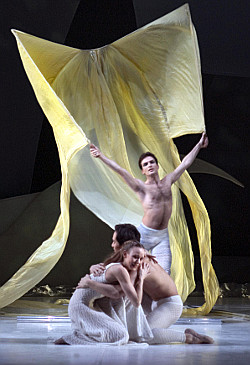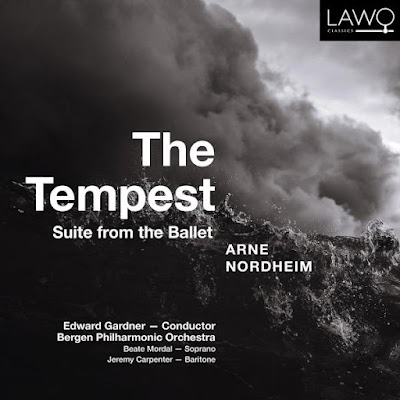Arne Nordheim; The Tempest, Suite from the Ballet; Bergen Philharmonic Orchestra, Edward Gardner, Beate Mordal, Jeremy Carpenter; LAWO Classics
Reviewed 7 March 2023
Nordheim's 1979 Shakespeare-based ballet in a single-disc distillation is full of magical timbres and a mysterious, seductive sound world
Whilst Shakespeare's The Tempest has constantly fascinated composers, few if any have managed to turn it into a coherent dramatic musical work. The drama itself is simply too elusive and changeable. I saw the Ballet Rambert's production of Glen Tetley's ballet, The Tempest in Edinburgh in 1979 or 1980. A full evening, two-act ballet that had no corps de ballet and was based on a distinctly modernist score, it was totally fascinating.
Tetley was commissioned for a new ballet by the Schwetzinger Festival and the resulting work was premiered at the Rokoko Theater, Schweztingen by Ballet Rambert in 1979. The score was commissioned from Norwegian composer, Arne Nordheim. In 2021, Edward Gardner and the Bergen Philharmonic Orchestra presented music from Nordheim's The Tempest in concert at the Bergen International Festival combining the music with, not dance, but with a visual retelling of the story.
On this new disc from Norwegian label, Lawo Classics, Edward Gardner and the Bergen Philharmonic Orchestra present Nordheim's The Tempest: Suite from the Ballet with soprano Beate Mordal and baritone Jeremy Carpenter.
There are eight movements to the suite, 'Calm Sea', 'Storm with Lightning and Thunder', 'Awakening', 'Magic Circle', 'Lacrymae', 'A Mazed Trod', 'Four Legs and Two Voices' and 'Caliban's Warning', some 50 minutes from a two-hour score. Nordheim writes for orchestra with double woodwind (including piccolo, cor anglais, bass clarinet and contrabassoon), horn, timpani, strings, percussion (three players), harp and celesta, plus of course the two wordless soloists and the electronics.
 |
| Glen Tetley's production of Arne Nordheim's The Tempest © Erik Berg |
As I remember, Tetley's scenario for the ballet brings out elements that are implicit in Shakespeare, so there was a large role for Sycorax, Caliban's mother. The booklet gives us no synopsis and the description of the score is purely a musical one, we are left to imagine a scenario based on Nordheim's thrilling music. For 1979, this music is perhaps somewhat idiosyncratic in its combination of the traditional and the advanced, there are tonal elements to the music, and expressive melodies, alongside musique concrète. All used to dazzling and sometimes seductive effect.
What you take away, at first, is the remarkable range of timbre and colour that Nordheim brings out in this music. Little of the writing is conventionally massive, in the late-19th-century orchestral tradition, instead, there are different lines, different colours and timbres. Percussion features a lot, and in 'A Mazed Trod' we have a tour de force of tuned and untuned percussion.
Tetley's treatment of Shakespeare's drama had an element of the abstract to it, something that is strongly conveyed in Nordheim's full score. And what we have here, in Edward Gardner's words, is a series of 'postcards of moods', each one different and each one amazingly demanding. The sound worlds conjured are perfect for The Tempest, and we seem to be in that world from the very opening seascape rather through to richly complex drama of the final movement.
The music receives a terrific performance from Gardner and the orchestra, he manages to bring a glorious clarity and transparency to Nordheim's writing so that much of the music seems to shimmer and even the most complex and hard-edged moments are clear. Because this music is rooted in a rather free interpretation of a familiar drama, there is an approachable element to the piece that perhaps makes it an ideal introduction to Nordheim's sound world. And once you hear it, I guarantee you'll be seduced.
Arne Nordheim; The Tempest, Suite from the Ballet
Bergen Philharmonic Orchestra
Edward Gardner (conductor)
Beate Mordal (soprano)
Jeremy Carpenter (baritone)
Recorded Grieghallen Concert Hall, Bergen, 16-18 August 2023
LAWO Classics LAWO1250 1CD [49:39]
Never miss out on future posts by following us
The blog is free, but I'd be delighted if you were to show your appreciation by buying me a coffee.
Elsewhere on this blog
- A journey through sound: looking up | looking out from a cellar full of noise - a trumpet, a tuba & live electronics create a bit of magic - record review
- An enjoyable romp: Rossini's 1825 coronation opera Il viaggio a Reims from English Touring Opera - opera review
- Style and youthful charm: English Touring Opera brings out the musical delights of Donizetti's murderous heroine, Lucrezia Borgia - opera review
- With Arctic she wanted to provide positivity and hope, to show what is worth preserving: Norwegian violinist Eldbjørg Hemsing on her latest project - interview
- Keenly dramatic: Puccini's Tosca at Opera North with a feisty Tosca, an unexpected Cavaradossi and a remarkable Scarpia - record review
- Intriguing reinventions: Danish accordion player Bjarke Mogensen's Album for Astor - record review
- Two major role debuts as ETO launches Spring tour with strong revival of Handel's Giulio Cesare - opera review
- Moments of musical magic: Dvorak's Rusalka at Covent Garden with Asmik Grigorian, & David Butt Philip conducted by Semyon Bychkov - opera review
- A bit of a whirlwind: counter-tenor Francis Gush discusses his forthcoming debut in the title role of Handel's Giulio Cesare with English Touring Opera - interview
- A voyage round Pauline Viardot: Anna Bonitatibus & Angela Hewitt in Berlioz, Liszt, rare late Rossini and something by the Viardot herself - concert review
- On Dead Man Walking: baritone Michael Lafferty on learning the role of Joseph de Rocher in Jake Heggie's opera for its Guildhall School performances next week - feature
- Home












No comments:
Post a Comment